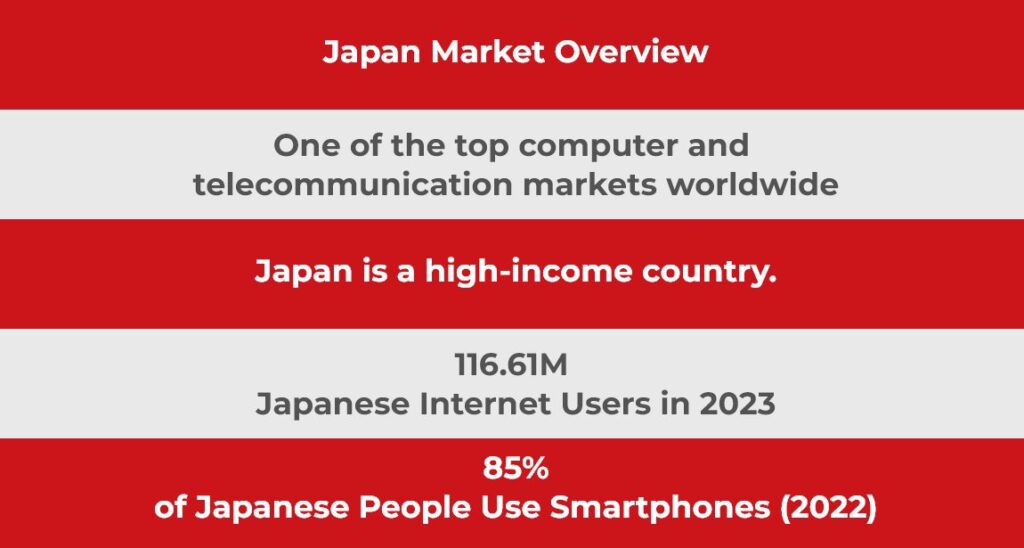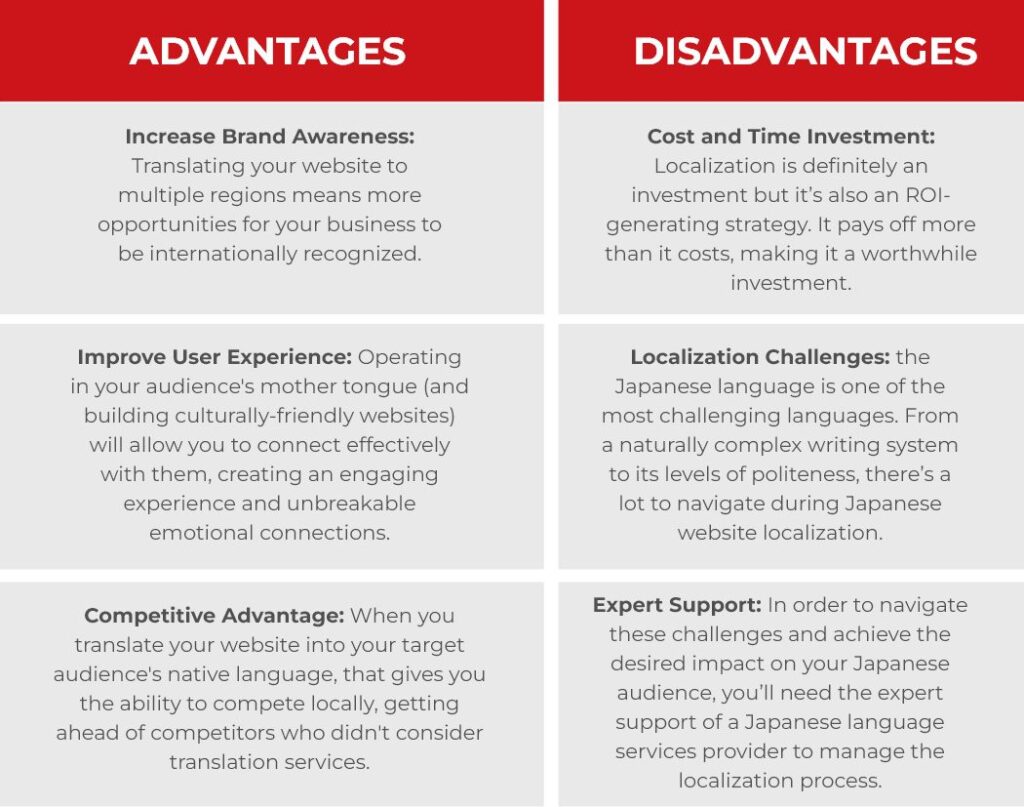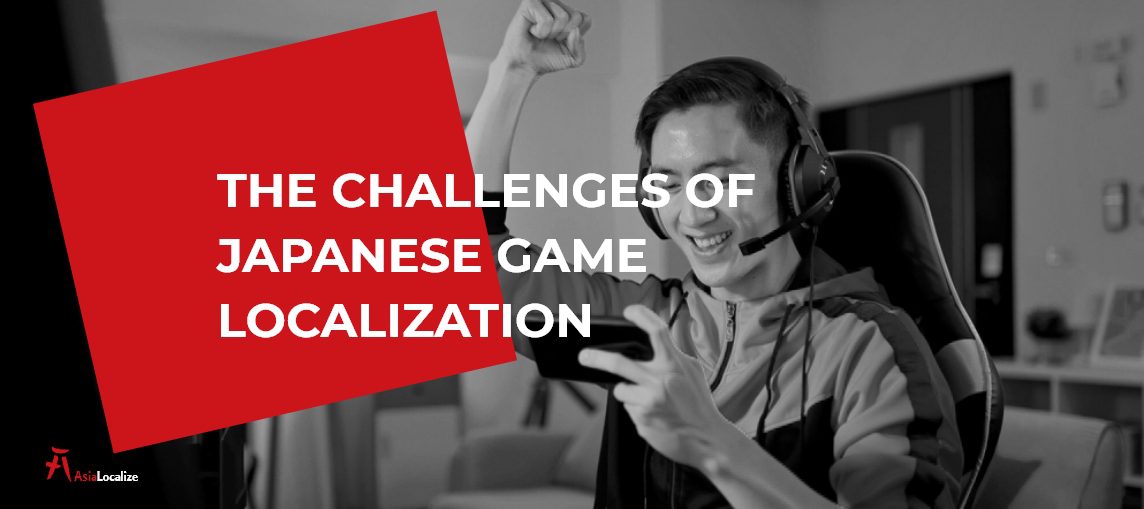What attracts Japanese consumers to buy from a foreign brand rather than local Japanese brands, such as Canon, Toyota, Nintendo, and Uniqlo? It’s a tricky equation to balance if you assume to compete and win against such big local players without playing it the right way.
And the first move to make is to polish your online presence through expert Japanese website localization. In a demanding market, such as the Japanese, you’ll have to deal with the picky, discerning Japanese customer, who more often than not chooses the local brand over the foreign one. As a business, you have to offer value and the highest levels of quality to sway Japanese shoppers.
Let’s face the fact that Japanese people are too loyal to turn their backs on local goods and services. Actually, if you deal with the Japanese the same way you deal with your home-country audience, your chances to make it in the Japanese market are slim.
Once a Japanese user enters your website, they can decide if they will try your product/service in less than a second or just give it a pass. Yes, it’s that simple! With one peek at your website, users can either turn out to be your loyal customer or a bounce rate.
So, your website should give a sense of relativeness and appeal to the Japanese consumer.
This article will help disclose the secrets behind successful foreign investments in Japan. We will discuss all you have to know about Japanese website localization, including the importance of localizing your website and best practices (how big brands pull it off in the Japanese market.)
Key Statistics About the Japanese Market
It’s widely known that Japan is one of the most attractive destinations for foreign investments worldwide since it boasts the third-largest GDP and economy globally after US and China. It’s an open opportunity for high-profit business potential. Here are some statistics you should know about the Japanese market:

- Japan is one of the top computer and telecommunication markets worldwide.
- Japan is a high-income country, directing its people to high-end products and services.
- According to Statista, Japan is one of the top countries with the largest number of internet users, up to 116.61 million in 2023
- According to Statista, around 85% of Japanese people use smartphones in 2022.
- According to International Trade Administration, Japanese consumers spent $305 on online products/services in January 2020.
These numbers show that Japan is a very prime spot for global investment. As a business, having an eye on the Japanese market is a smart move despite the many challenges you’ll have to overcome to succeed in such a worthy market, including the Japanese linguistic and cultural nuances.
Why Is It Indispensable to Localize Your Website In Japan?
In general, expanding to global markets is an excellent opportunity for successful brands to open up new unexplored doors towards a solid worldwide presence and, subsequently, a sales and revenue increase. However, unsystematic expanding approaches will take you to a dead-end and ultimately compromise your reputation.
For instance, if you are planning to enter the Japanese market, one systematic approach to consider is a comprehensive localization strategy that integrates Japanese website localization. And sometimes, businesses go as far as localizing even their products to suit the Japanese locale.But we are tackling websites today because it`s one way you can gain a foothold online in the dynamic Japanese market.The Japanese audience tends to trust and go for Japanese-speaking websites over English-speaking ones. That`s because English language proficiency is low in Japan.

Not only that but poorly localized Japanese websites can absolutely backfire.
Japanese localization is not all about the language; it’s not a word-for-word translation-to-Japanese approach. It also incorporates cultural and usability preferences; it’s how to comply with the Japanese people’s consensus, tastes, and needs.
For example, Dyson, a British household appliances company, designed a new smaller vacuum cleaner based on market research for the Japanese. And it turned out to be a big success in the Japanese market.
English vs. Japanese
Many renowned global brands chose to expand in Japan, counting on English as their primary language rather than Japanese. And they still managed to succeed despite that.
You must be wondering, can you just do that? Can English do the job?
Actually, not all brands can achieve this unless they’re already giant international players, such as Adidas and Nike. In this case, a foreign language (English) can appeal to the Japanese people. Their famous, recognizable look and feel and branding can act as an advocate in this matter.
So, what are the advantages and disadvantages of working with your main English website version in Japan?

Operating in Japanese will give you an edge over many competitors who don’t take a fundamental step toward the Japanese website localization world. By creating a relevant experience culturally, linguistically, and aesthetically, you’ll be able to achieve effective communication with your Japanese customer.
And now, what are the advantages and disadvantages of working on a new version designed specifically for the Japanese market?

To appeal to the Japanese audience, big brands localize their message, ideas, and content marketing into the Japanese language and culture they reinvent their outer look to cater to the Japanese audience while still retaining their inner personality and touch. Through a winning localization strategy, they construct a robust global presence on a Japanese plate.
Firstly, they Japanize their website, the first stop of their customers. It’s an essential step if you want to win the trust of such a demanding audience. To follow in the footsteps of those who achieved success in Japan, we got you their secrets. Here is how is that possible:
- They Start Serious Planning Before Any Serious Moves
As a matter of fact, taking time to prepare for a solid expansion is your first actual move toward success in Japan. Your target demographics, local competitors, and market trends are some of the most critical aspects that you have to look into before establishing your expansion strategy. Overlooking this part can cost you a lot, directing you in the wrong direction in an unforgiving market such as the Japanese.Whether you have a local partner or an in-house team who handles the market research, take your time and be patient. Understanding the ins and outs of the Japanese market is indispensable there is no room for mistakes.
- They Go For Professional Website Translation & Localization Company
Working with an expert Japanese-based website localization agency will surely pay off since high-quality website translation services require long-standing experience and thorough approaches. And since the Japanese always look for perfection and don’t accept any linguistic or cultural mistakes, expertise is a must for one of the most complicated languages in the world. Levels of politeness are one of the challenges that can take you in a totally wrong way (if not done correctly) and cause irreparable damage to your relationship with your Japanese audience.Also, the Japanese cultural aspect will never be tackled correctly without getting a local in your corner due to the cultural diversity in Japan. With the help of an expert Japanese translation and localization agency, you will get reliable, failproof Japanese website localization and translation services that are culturally relevant and error-free through TEP services and multi-phased testing processes.
- They Never Overlook their Web Design
Customizing your website design for the Japanese audience is as important as the content. There are two elements that the Japanese shoppers are searching for once they land on your website: more information and eye-catching designs. In order to cater perfectly to them, go for a more aesthetic approach. But not just any colors; there are color preferences for the Japanese people.
Color Connotations in Japanese Culture
Red: Luck
Blue: Peace & Stability
Yellow: Courage
Black & White: Mourning and Sadness
Purple: Danger
Check the Japanese Starbucks website below! It’s such a hit as you can see, it resonates with Japanese preferences through the rich text, lots of colors, and few images.
PS: there are no spaces between Japanese words, so customizing your UI is also of the utmost importance.
And at the end, one can say that flexibility is an essential trait that businesses should have when planning to succeed in the Japanese market. To illustrate, as we stated before, many brands decided even to redesign their products and services to better suit the Japanese audience and climb to the top. So, it’s how to nail the art of adeptness in the new market.
But with the help of an expert Japanese translation and localization agency, you’ll be able to overcome any challenges on your way to Japan, tackling the intricacies of the Japanese language and culture.
Looking for a local expert to support your business expansion in Japan? AsiaLocalize is an expert translation agency that`s based in Asia and equipped to deliver high-quality language solutions in almost all Asian languages, and mainly Japanese. From document translation to website and app localization and more, we don`t only provide multilingual solutions, we provide exceptional personalized experiences that drive your global customer satisfaction and business growth.











